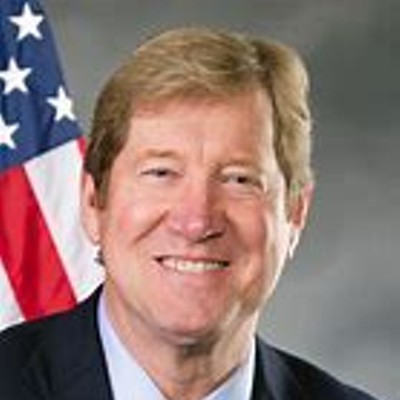ROBOCOP BEATS KROMKO ON TECHNICALITY
The Skinny mentioned a few weeks ago that the marquee issue of this year's city election could be the initiative to ban those traffic cameras that bust speeders and drivers who run red lights—if the proposition made the ballot.
It's a good thing we qualified our report, because city officials tossed the petitions on Monday, July 22.
Former state lawmaker John Kromko needed 12,730 valid signatures from Tucson voters to qualify for the ballot. He turned in more than 20,000 signatures, but a
legally required random check of 5 percent of the signatures by the Pima County Recorder's Office showed that only 55 percent of the signatures were valid. Based on that rate, Kromko had only 11,124 valid signatures, according to City Clerk Roger Randolph.
"I just issued a certificate of insufficiency to the Mayor and Council and to John," Randolph told The Skinny on Monday afternoon.
Pima County Voter Registrar Chris Roads, who oversaw the random check, said that of the 1,032 signatures the office checked, only 569 were registered Tucson voters.
A total of 220 of the bad signatures came from people who were not registered to vote (at least in Pima County), while another 181 came from outside Tucson's city limits, according to Roads. The remainder were rejected for various technical reasons.
Kromko told The Skinny on Monday that he was still looking into why the signatures were rejected, but he expected it would be hard to reverse the decision to toss his petitions.
"It looks like we didn't make it," Kromko said. "It looks like I can't challenge this. What killed us was people not registered. It's hard to fight that one."
Kromko has had some luck getting initiatives on the ballot in the past, such as a 2007 effort to get voters to repeal the city's trash-collection fee and block delivery of treated effluent to households. (The initiative was rejected by voters.)
But in recent years, his signature-collection efforts have been troubled. The worst example was a 2008 run for the Arizona Legislature that resulted in Kromko facing criminal charges over fraudulent signatures on his nominating petitions. Kromko eventually pled guilty to forgery charges rather than risk going to trial and spending the rest of his life behind bars.
Kromko said he was mad that he didn't have enough signatures but nonetheless took pride in his all-volunteer effort.
"It's been many years since I've been able to get anything on the ballot without paying at least some people," Kromko said.
In other initiative news: The city has certified that an initiative to reform the city's pension program has enough signatures to make the ballot. Money to pay for the Committee for Sustainable Retirement Benefits' effort came from an out-of-state organization that is pursuing similar initiatives across the country.
City officials have warned that the pension initiative would force taxpayers to redirect money from city services to paying off pensions under an accelerated schedule.
As Ward 6 Councilman Steve Kozachik told The Skinny: "What this group is doing is proposing a one-size-fits-all solution in several different states. I've looked at the petition language and the fundamental question it leaves unanswered is how they're going to protect the General Fund from collapsing under the weight of people opting out of the current plan. You don't kill the patient in order to cure the disease. Unless they can explain how collapsing the system is going to save it, I'm not on board with what they're proposing."
THINK OF THE CHILDREN
While House Speaker John Boehner has been promising to torpedo the U.S. Senate's comprehensive immigration-reform legislation, he and Majority Leader Eric Cantor tried to be a little kinder and gentler last week.
Both Boehner and Cantor expressed support for the basics of the DREAM Act, which would provide a path to citizenship for undocumented youth who were brought to the United States as young kids and grew up here.
The DREAMers tend to generate sympathy even among people who are opposed to a pathway to citizenship for other undocumented people now living in the United States. As Boehner himself put it, according to a report on Talking Points Memo last week: "This is about basic fairness. These children were brought here by no accord of their own, and frankly they're in a very difficult position. And I think many of our members believe that this issue needs to be addressed."
GOP House members are crafting their own version of the DREAM Act, but the details remain sketchy. Until a final bill comes along, it's impossible to say what kind of game that Boehner is playing here.
But Boehner's newfound sympathy for DREAMers represents something of an evolution. Boehner told reporters in April 2012 that passing a version of the DREAM Act then being shopped around by Sen. Marco Rubio "would be difficult at best," according to a CBS News report.
And both Boehner and Cantor voted against the DREAM Act when it actually came up for a vote in December 2010.
So what's behind the switch? We imagine it has something to do with recognizing that the GOP needs to make some effort to stop alienating Latino voters. If it's also an effort that helps undermine the Senate's comprehensive immigration-reform package, all the better. Republicans would love to put Democrats on the spot by having them vote against some kind of watered-down version of the DREAM Act.
But to embarrass Democrats on a DREAM Act vote requires persuading conservative Republicans to go along with the scheme—and Boehner's efforts to play that kind of political chess have blown up in his face several times already, thanks to the more basic checkers that his caucus prefers.
JOHN McCAIN: THE 2013 MODEL
Sen. John McCain appears to have reinvented himself once again in the last few weeks.
The new model is a throwback to the version of John McCain who was on display in the late '90s and early 2000s, before his presidential ambitions had him pandering to the GOP's right wing.
In the last week, McCain struck a deal to stop the relentless filibustering of nearly any nominee to head a department or agency in the Obama administration and called for a review of stand-your-ground gun laws in the states. (As an aside: McCain appeared terribly out of touch with the Arizona Legislature when he told CNN over the weekend that he was "confident" that members of the Arizona Legislature would review the stand-your-ground law. Just months ago, GOP lawmakers made it illegal for local governments to destroy guns turned in by citizens who want the weapons to be destroyed.)
Last week's actions came after other moments of conservative heresy: McCain's push for immigration reform, his willingness to consider new revenue as part of a budget-balancing deal with Democrats and his dismissal of fellow GOP Sens. Ted Cruz of Texas and Rand Paul of Kentucky as "wacko birds" a few months back.
What's next? Is McCain going to go back to worrying about climate change? You'd almost think McCain was turning into a big ol' moderate in his old age.
Is it too late in his career for McCain to reinvent himself once again? Libs aren't going to warm up to his voting record and aren't likely to ever forgive him for inflicting Sarah Palin upon the political universe, while conservatives are going to see him as betraying them once again.















